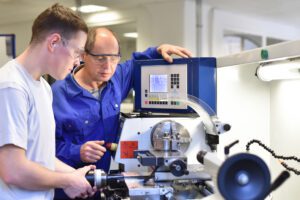A growing skills gap is set to challenge small and medium-sized manufacturers across England in 2025, with nine in ten SMEs reporting shortages in key areas — particularly at entry level — according to new data from the Skills Horizon Barometer.
Now in its third year, the report, launched by the Department for Education’s Skills for Life campaign, shows that 92% of manufacturing SMEs are anticipating a skills shortfall within their business over the next year. A third (33%) say this gap exists at entry level, while 38% have flagged specialist roles as a growing concern.
Despite the persistent challenges, concerns about staff retention have eased slightly. Just 30% of SMEs said it was a worry this year, compared with 33% in 2024.
The research, which includes insight from manufacturers such as Hampshire-based Southbourne Rubber, also highlights a shift in employer priorities. AI and digital skills are fast climbing the recruitment agenda, with 23% of firms planning to either train staff in AI or recruit individuals with AI expertise. One in five (19%) SMEs say they already use AI regularly in daily operations, and another 20% use it occasionally.
While technical ability remains in demand, manufacturers are also placing increasing value on soft skills and character traits.
When it comes to recruitment pipelines, the report finds a growing appetite among manufacturers to develop early-career talent. Nearly half (49%) of businesses are looking to hire entry-level candidates who already have some workplace experience. While 19% continue to prioritise graduates from traditional academic routes, 22% are open to hiring directly from school or college, and a quarter (25%) say they would consider candidates with transferable skills from unrelated sectors.
The Skills Horizon Barometer aims to support SMEs in identifying routes to talent through technical education pathways such as Apprenticeships, T Levels, Higher Technical Qualifications (HTQs), Skills Bootcamps, and digital and numeracy courses.
Stephen Wilde, Managing Director of Southbourne Rubber, said apprentices are playing a vital role in filling workforce gaps and shaping future growth.
“Like other SMEs, we want to onboard more entry-level staff members in 2025 and will be looking to apprentices to do so,” he said. “We typically hire three to four apprentices a year. The benefit is being able to upskill people to meet demand while focusing on personality and culture fit — we train them from the ground up and bring in fresh thinking and enthusiasm.”
Wilde added: “I’d encourage other businesses facing skills shortages to explore the technical education routes available. From our experience, they’re a valuable long-term investment.”
Minister for Skills, Apprenticeships and Higher Education, Jacqui Smith, said closing the skills gap is a national priority: “Meeting the skills needs of the next decade is central to delivering the Government’s Plan for Change.
“Employers are key partners in our mission. Through Skills Bootcamps, apprenticeships, HTQs, and T Levels, we’re equipping businesses and individuals to thrive — and laying the foundations for long-term economic growth.”
Read more:
Nine in ten manufacturing SMEs report skills gaps heading into 2025
